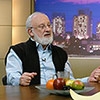 Question: How are the autumn holidays of Rosh HaShana (New Year), Yom Kippur (Judgement Day), and Sukkot, explained from the perspective of Kabbalah?
Question: How are the autumn holidays of Rosh HaShana (New Year), Yom Kippur (Judgement Day), and Sukkot, explained from the perspective of Kabbalah?
Answer: Our entire work lies in the need to collect and reconnect the broken shards of a shattered system called Adam back into a unified whole. There was a system, one soul, one mechanism, one desire, and then this desire shattered into a multitude of pieces. And we need to collect all these desires into one general desire the way it was prior to its shattering. This is our main task. That means, a person who did or did not contribute some kind of effort toward this task during the past year must examine himself.
This self-examination is the purpose of the week prior to the New Year, during which we need to think about how we spent the past year, to what extent we contributed to creating the right kind of foundation for humanity to unite in friendship, love, and mutual guarantee among them. It is an assessment of what I have yet to complete, and it’s called Slichot, translated as “forgiveness.” We don’t need forgiveness from anyone, only from ourselves: where did I blunder, where didn’t give enough, where didn’t I judge correctly, etc.; all this is with respect to our effort in creating unity among people. I examine myself: Did I have the opportunity? What kind and how did I realize it?
After this self-examination, the New Year begins. New Year means that I begin a new cycle of the calendar starting from a particular day. This day is called the birth of Adam. In other words, the New Year that we celebrate is the day Adam was born.
But what does it mean to be born? There once existed a person who suddenly received an awakening: the entire panorama of the controlling system of our world and the need for people to unite was revealed to him. All this he described in the book HaMalach Raziel (Secret Angel). After him, students continued to pursue this revelation, and so on, to the present day.
That is why we celebrate the day of the appearance of the first person in our world who revealed this system of connection between people, how we should be interconnected, and how we could achieve our correction and come to unity. Then, after we decide that this is the way we choose to act, the ten days after New Year begin, leading up to Judgement Day when we examine, with precision, each of the ten Sefirot of our soul, each day focusing on a specific Sefira, and we begin to determine how much we still have to do and where we still need to correct ourselves.
Then begins a 24-hour period, called the Day of Judgement when we have to evaluate our behavior and we have to reveal the hatred we hold toward each other, our rejection of one another. We then need to ask for forgiveness from each other; we need to actually draw closer to each other so that this forgiveness is not just a formality, but is truly coming from a cleansed heart. Judgement Day is a day when we attempt to penetrate all the corners, all the hidden places of our egoism, and pull it all out and promise ourselves that we will correct all of it and come to unity among us.
After this, we have five days corresponding to the five Sefirot: Keter, Hochma, Bina, Zeir Anpin, and Malchut, and then the holiday of Sukkot begins. Sukkot is a time when we begin to receive correction from the Surrounding Light (Ohr Makif), which is shining upon us through the roof we build ourselves out of green branches of plants.
We sit in this sukkah for seven days, allowing this Light to act upon us, all the way through to completion, through Hesed, Gevura, Tifferet, Netzach, Hod, Yesod, and Malchut. And each day we celebrate the correction of each Sefira of our soul, which is the result of the action of the Surrounding Light.
When we completely correct our soul, it can receive the upper Light. That is why this day is called the holiday of the Torah, that is, the holiday of Light. That’s how we conclude the complete cycle of the autumn holidays.
We learn about the manner in which we should act, how our soul is built, and what corrections the soul goes through in each moment of time. A great deal of literature is devoted to this. And all of this is described in specific, physical laws of our inner world.
[213870]
From the Kabbalah Lesson in Russian, 9/25/16
[213870]
From the Kabbalah Lesson in Russian, 9/25/16

No comments:
Post a Comment